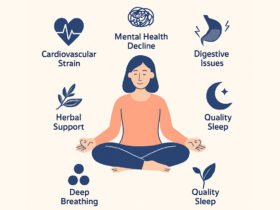Getting a good night’s sleep is essential for your physical and mental health. Yet, many people struggle to get the recommended 7-9 hours of sleep each night. Poor sleep quality can lead to a range of health problems, including increased stress levels, weakened immune system, and even weight gain. Fortunately, there are several healthy habits that you can adopt to improve your sleep quality and wake up feeling refreshed.
-
Stick to a Regular Sleep Schedule
One of the most effective ways to improve your sleep quality is to establish a consistent sleep schedule. This means going to bed and waking up at the same time every day, even on weekends. By doing so, you help regulate your body’s natural sleep-wake cycle, which can help you fall asleep more easily at night and wake up feeling more refreshed in the morning.
-
Create a Relaxing Sleep Environment
Creating a comfortable sleep environment is essential for a good night’s rest. Keep your bedroom cool, quiet, and dark to promote relaxation. Invest in comfortable pillows and bedding that support your body and help you sleep more soundly. If you’re sensitive to noise, consider using earplugs or a white noise machine to drown out any outside sounds.
-
Limit Exposure to Blue Light Before Bed
Electronic devices emit blue light, which can suppress the production of the sleep hormone melatonin, making it harder to fall asleep. To improve your sleep quality, limit your exposure to electronic devices, such as smartphones, tablets, and computers, for at least an hour before bed. If you must use these devices, consider using a blue light filter or wearing blue light blocking glasses.
-
Avoid Caffeine and Alcohol Before Bed
Caffeine is a stimulant that can keep you awake, even several hours after consumption. Avoid drinking coffee, tea, or other caffeinated beverages in the afternoon and evening. Alcohol, on the other hand, can disrupt your sleep cycle, leading to poor sleep quality. While a glass of wine may help you feel relaxed, avoid drinking alcohol within a few hours of bedtime.
-
Practice Relaxation Techniques Before Bed
Stress and anxiety can interfere with your ability to fall asleep and stay asleep. Practicing relaxation techniques, such as meditation, deep breathing, or yoga, can help calm your mind and prepare your body for sleep. You can also try taking a warm bath or reading a book to help you unwind before bed.
-
Exercise Regularly
Regular exercise can improve sleep quality and help you fall asleep more easily. Aim for at least 30 minutes of moderate-intensity exercise most days of the week. However, avoid exercising within a few hours of bedtime, as it can make it harder for your body to relax and fall asleep.
-
Follow a Healthy Diet
The foods you eat can also affect your sleep quality. Avoid eating heavy meals or snacks close to bedtime, as it can cause discomfort and make it harder to fall asleep. Instead, aim for a light snack, such as a piece of fruit or a handful of nuts, a few hours before bed. Additionally, try to include foods in your diet that are rich in nutrients that promote sleep, such as magnesium, potassium, and melatonin.
By incorporating these healthy habits into your daily routine, you can improve your sleep quality and wake up feeling more refreshed and energized. Remember, it may take some time to establish these habits, so be patient and persistent in your efforts. With time and consistency, you can enjoy the benefits of a better night’s sleep.












Leave a Reply